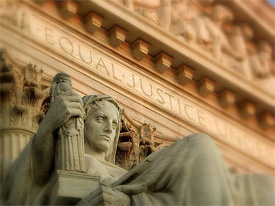As you will recall, Scott Bloch is the senior governmental attorney who formerly served as head of the United States Office of Special Counsel:
The U.S. Office of Special Counsel (OSC) is an independent federal investigative and prosecutorial agency. Our basic authorities come from four federal statutes: the Civil Service Reform Act, the Whistleblower Protection Act, the Hatch Act, and the Uniformed Services Employment & Reemployment Rights Act (USERRA).
In short, it is an unique, but quite important, entity in the federal government, and is entrusted with protecting the sanctity of whistleblowers, who are one of the last checks on an increasingly imperious federal government, and especially the Executive Branch thereof. Mr. Bloch refused to do his job appropriately under the Bush/Cheney Administration and, when members of his own staff, including attorneys, attempted to blow the whistle on Bloch, the man entrusted with protecting whistleblowers unconscionably retaliated against them and blatantly destroyed governmental property and statutorily protected electronic files evidencing his acts.
Once informed of the questionable, inappropriate and/or patently illegal acts by Bloch, the Chairman and Ranking Member of the House Oversight Committee instigated a formal Congressional investigation of Bloch. On March 4, 2008, in the course of formal interviews with Oversight Committee staff, Bloch withheld critical information and lied. (See Bloch’s signed Stipulation of Facts dated 4/27/2010). Bloch entered into a plea agreement with the government and has been awaiting sentencing by Magistrate Judge Deborah Robinson of the District of Columbia District Court.
As Marcy Wheeler and I previously explained, the Obama Department of Justice is furiously colluding with the defendant they are supposed to be prosecuting, Scott Bloch, to ensure that he never does a day in jail for his crimes, and there appears to be no credible reason they are doing so:
The Department of Justice has literally teamed up with Scott Bloch-who previously plead guilty to blowing off Congress–to try to help him avoid any jail time, at any cost to credibility, for that crime. The extent of this collusion first became apparent in a ruling dated February 2, 2011 by Federal Magistrate Judge Deborah Robinson, who is handling the matter.
…
Now, there’s more than a chance that what is going on here is DOJ scrambling to prevent Bloch from doing jail time because they–part of the Executive Branch–like it that people like Alberto Gonzales, Monica Goodling and John Yoo have managed to avoid almost all Congressional oversight. And, now with Darrell Issa cranking up the not-so-way back investigatory machine, they really do not want a precedent made that executive branch officials who lie to Congress have to – gasp – actually serve jail time.
…
Then, the willingness of the government prosecutors to fight to keep the criminal Bloch from serving one lousy second in jail goes from the absurd to the ridiculous. A mere four days after having filed the whiny Motion to Reconsider, and before it was substantively ruled on, the government, by and through the ever ethical DOJ, suddenly files a pleading encaptioned “Governments Motion To Withdraw Its Motion To Reconsider The Court’s February 2, 2011 Memorandum Opinion“. In this pleading, the government suddenly, and literally, admits their February 2 Motion to Reconsider was without merit.
The foregoing is the background that brings us to where we are today, with a DOJ unconscionably, and with at least questionable ethics, literally fighting tooth and nail to help Scott Bloch get out of his pleas deal because he might actually have to serve 30 days in jail for his crimes. What, as the remainder of this article, and argument to the court, will delineate is that there is no merit to the attempted withdrawal and, incredibly, both Bloch and the DOJ entered into written covenants that they would not attempt to do so. For the reasons described below, Judge Robinson should deny Mr. Bloch’s motion to withdraw, and the craven DOJ joinder therein, and sentence Mr. Bloch pursuant to the plea and in accordance with her finding and inclination stated in her February 2, 2011 Memorandum Opinion.
I. The Mandatory Minimum Is In The Statute Itself
Defendant Bloch cites and argues Federal Rules of Criminal Procedure (FRCrP) Rule 11(b)(1)(I) for the proposition he should be allowed to withdraw from his plea because the court did not explain, and he did not understand, there was a minimum mandatory sentence of one month in jail.
This is a specious and meritless argument. The existence of the mandatory month in jail is not the creature of some arcane and separate sentencing provision or the result of the confusing federal sentencing guidelines or some other hard to grasp source. No, the requirement of one month incarceration is directly and specifically in the the statutory crime Mr. Bloch pled guilty to under 2 USC 192:
Every person who having been summoned as a witness by the authority of either House of Congress to give testimony or to produce papers upon any matter under inquiry before either House, or any joint committee established by a joint or concurrent resolution of the two Houses of Congress, or any committee of either House of Congress, willfully makes default, or who, having appeared, refuses to answer any question pertinent to the question under inquiry, shall be deemed guilty of a misdemeanor, punishable by a fine of not more than $1,000 nor less than $100 and imprisonment in a common jail for not less than one month nor more than twelve months. (emphasis added)
For Mr. Bloch to say he did not know of the mandatory incarceration provision, and that the court did not advise him, defies both clear logic and complete credibility. At the April 27, 2010 plea proceeding in front of the court, under oath and on the record, Defendant Bloch stated definitively and unequivocally that he knew, had read, been briefed by competent counsel and understood completely the charge he was pleading guilty to. Bloch, his attorney and the prosecuting AUSA in charge of the case for the DOJ, Mr. Glen Leon, avowed to the court there was no impairment and no reason whatsoever Bloch did not know what he was doing and could not knowingly enter into the plea. (See Plea Hearing Transcript, Exhibit 1 to Bloch Motion to Withdraw).
The following pertinent portions of the plea proceeding apply:
THE COURT: Do you understand the charge that is alleged in the Information?
THE DEFENDANT: I do, Your Honor.
…..
THE COURT: Has anyone promised you what sentence will actually be imposed?
THE DEFENDANT: No one has promised me that, Your Honor.
…..
THE COURT: Do you know that if the sentence is more severe than you now expect it will be, that you are still bound by your plea, and that you will not be permitted to withdraw your plea for that reason?
THE DEFENDANT: I understand that, Your
Honor.
THE COURT: Do you understand, sir, that parole in the federal system has been abolished, so that if you are sentenced to a period of incarceration, you will not be released early on parole?
THE DEFENDANT: I believe I do understand that, Your Honor. Yes.
THE COURT: Do you need more time to discuss any of the questions I just asked, or any of your own questions about sentencing, with your lawyers before we continue?
THE DEFENDANT: No, I do not, Your Honor
Defendant Bloch repeatedly, under oath, swore he understood the charge, knew the penalties associated with the charge, knew the final sentence was in the Court’s discretion and there was even discussion on the record about the potential for a sentence of incarceration and the temporary provision of pre sentence release. The plea agreement itself specified:
Your client agrees to plead guilty to a one-count Information, a copy of which is attached, which charges a misdemeanor violation of 2 U.S.C. 192 (Criminal Contempt of Congress).
The record is crystal clear. Mr. Bloch himself is an experienced attorney and had the assistance of extremely gifted retained counsel (not just one, but a battery of them). There was no ambiguity as to the offense Defendant Bloch was pleading guilty to. The minimum one month incarceration period is clear as day and directly specified in the elements and body of the criminal statute, 2 USC 192, Bloch pled guilty to.
Further, as the citation to United States v. Padilla, 23 F.3d 1220, 1222 (7th Cir. 1994) in Defendant Bloch’s own motion delineates, “The relevant inquiry must center upon what the defendant actually knows when he pleads guilty.” Well, in the instant case, Defendant Bloch swore under oath and penalty of perjury that he knew exactly the criminal provision he was pleading guilty to, and what he now disingenuously claims ignorance to is in that statute, in glaring black and white, for the world to see. Mr. Bloch’s sudden claim of ignorance is dishonest, in bad faith and does not constitute just cause for withdrawal.
Rule 11(d) specifies that once a plea has been accepted on the record by the court, which is the case here, withdrawal by a defendant can only occur where the court rejects the plea or where “a fair and just” basis is established. Neither circumstance applies in the case of Mr. Bloch.
II. It Was Not A “Probation Plea” and the Terms and Conditions Forbid Withdrawal
The nature and tenor of Defendant Bloch’s motion to withdraw effectively presents a defendant who entered into a probation only plea and is shocked, shocked that he may actually serve some minimal jail time. Yet the plea was not a “probation plea”, and the parties, court, Mr. Bloch, the plea agreement letter and the plea proceeding were all crystal clear that incarceration, within the contemplation of the statute and relevant guidelines, was quite possible, and that Bloch would not be permitted to withdraw if that was the case so long as the sentence was within guidelines.
The plea agreement letter provides in pertinent parts:
The parties further agree that a sentence within the Stipulated Guidelines Range would constitute a reasonable sentence in light of all the factors set forth in 18 USC 3553(a). In addition, neither party will seek a sentence outside of the Stipulated Guidelines Range or suggest that the Court consider a sentence outside the Stipulated Guidelines Range.
….
It is understood that the sentence to be imposed on your client is determined solely by the Court. It is understood that the Sentencing Guidelines are not binding on the Court. Your client acknowledges that your client’s entry of a guilty plea to the charged offense authorizes the sentencing Court to impose any sentence, up to and including the statutory maximum sentence, which may be greater than the applicable Guidelines range. The Government cannot, and does not, make any promise or representation as to what sentence your client will receive. Moreover, it is understood that your client will have no right to withdraw your client’s plea of guilty should the Court impose a sentence outside the Guidelines range. (emphasis added)
The net result of the above stipulation, made both in the plea agreement letter dated April 19, 2010, and confirmed and further established in the plea proceeding in open court on April 27, 2010, is that Defendant Bloch made a deal in which he
(a) agreed not to contest a guidelines sentence imposed by the Court,
(b) waived his right to withdraw his plea so long as the Court sentenced legally, and
(c) waived the non-admissability of his allocution under FRCrP Rule 11(f).
The plea document literally stipulated:
It is further agreed that any sentence within the Stipulated Guidelines Range is reasonable.
in conjunction with both parties waiving any appeal rights.
Defendant Bloch entered into a plea agreement, and stood before the court to confirm it, that gave him a sweetheart deal to a misdemeanor crime with liberal and favorable further stipulations that he would be classified under the lowest available sentencing guidelines for calculation and imposition of his sentence. He swore he would not seek to withdraw, and the Court instructed him there would be no such withdrawal permitted so long as he was treated within the parameters of his plea. The proposed sentence indicated by the Court in its February 2, 2011 Memorandum Opinion is more than within those constricts. Mr. Bloch’s plea does not permit the action he, and the collusive government, now seek.
Conclusion
The number and quality of felony crimes Bloch could have been, and should have been, charged with are staggering; including obstruction of justice, false statements, perjury, willful destruction of government property and Federal Records Act violations. But Defendant Bloch made a deal to plead to one little misdemeanor with the guarantee he would be considered under the most favorable sentencing guideline conditions imaginable. And, in return for this staggeringly kit gloved treatment, both Bloch and the government swore and promised not to withdraw or appeal. Yet, here they both are in front of this Court seeking to do just that. It is scandalous and should not be permitted by the Court. But there is much more to this case than just that.
It is the duty of the federal court system to provide fair and impartial justice to those before it and to stand as one of the three co-equal branches of government with a solemn duty to protect the sanctity of the government and see that justice is done not just for the powerful and privileged, but for all. For a misdemeanor plea case, there are powerful and critical factors involved in the instant case that warrant consideration by the Court. Central is the question of whether there is now, and will be in the future, meaningful accountability for Executive Branch officials as to the crimes they commit in office and in the peoples’ names.
As described at the start of this essay, our government and constitutional rule of law fails if Executive Branch officials can lie and destroy material evidence, not only to shield themselves from accountability, but to mask their efforts to deny legitimate governmental whistleblowers the light of day with which to inform and protect the public. It is truly that fundamental. And when you then compound the problem with fellow Executive Branch attorneys and officials colluding to minimize the crimes and frustrate even the minimum statutory punishment, the issue, and thus the case of Mr. Bloch, becomes of immense importance.
This Court, in its February 2, 2011 Memorandum Order, noted:
Thus Congress’s intent was to make the penalty for violating the statute punitive. See Russell v. United States, 369 U.S. 749, 755 (1962) (“In enacting the criminal statute . . . Congress invoked the aid of the federal judicial system in protecting itself against contumacious conduct.”) (quoting Watkins, 354 U.S. at 207). With respect to sentencing, the statute, as enacted in 1857, provided that “on conviction,” a person “shall” pay a fine and “suffer imprisonment in the common jail not less than one month nor more than twelve months.” Act of January 24, 1857, ch. 19, 11 Stat. 155 (emphasis supplied).
These words and opinion are exactly why this Court should deny Defendant Bloch’s motion to withdraw and sentence him as previously contemplated. It is literally the least he deserves. As the Court stated, the federal judiciary has a duty, in conjunction with Congress, to protect against contumacious conduct. This Court should fulfill that duty, stand for the people and rule of law, and send a message to Mr. Bloch and subsequent Executive Branch officials that there is a penalty for criminal behavior in obstruction and contempt of Congress, and that it will be enforced.
 There is only one substantive case left in litigation with the ability to bring tangible accountability for the illegal and unconstitutional acts of the Bush/Cheney Administration’s warrantless wiretapping and surveillance program. That case is Al-Haramain v. Bush/Obama. Yes, there is still Clapper v. Amnesty International, but that is a prospective case of a different nature, and was never designed to attack the substantive crimes of the previous Administration.
There is only one substantive case left in litigation with the ability to bring tangible accountability for the illegal and unconstitutional acts of the Bush/Cheney Administration’s warrantless wiretapping and surveillance program. That case is Al-Haramain v. Bush/Obama. Yes, there is still Clapper v. Amnesty International, but that is a prospective case of a different nature, and was never designed to attack the substantive crimes of the previous Administration. 



